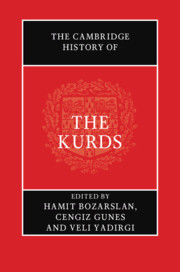Book contents
- The Cambridge History of the Kurds
- The Cambridge History of the Kurds
- Copyright page
- Contents
- Figures
- Maps
- Tables
- Contributors
- Acknowledgements
- Abbreviations
- Additional material
- Introduction
- Part I Historical Legacies
- Part II Regional Political Developments and the Kurds in the Twentieth and Twenty-First Centuries
- 7 Kurds and Kurdish Nationalism in the Interwar Period
- 8 From Tribal Chiefs to Marxist Activists
- 9 Kurdish Politics across the Middle East during the 1970s
- 10 Dark Times
- 11 Kurds in a New Century
- Part III Domestic Political Developments and the Kurds in the Twentieth and Twenty-First Centuries
- Part IV Religion and Society
- Part V Kurdish Language
- Part VI Art, Culture and Literature
- Part VII Transversal Dynamics
- Index
- References
7 - Kurds and Kurdish Nationalism in the Interwar Period
from Part II - Regional Political Developments and the Kurds in the Twentieth and Twenty-First Centuries
Published online by Cambridge University Press: 13 April 2021
- The Cambridge History of the Kurds
- The Cambridge History of the Kurds
- Copyright page
- Contents
- Figures
- Maps
- Tables
- Contributors
- Acknowledgements
- Abbreviations
- Additional material
- Introduction
- Part I Historical Legacies
- Part II Regional Political Developments and the Kurds in the Twentieth and Twenty-First Centuries
- 7 Kurds and Kurdish Nationalism in the Interwar Period
- 8 From Tribal Chiefs to Marxist Activists
- 9 Kurdish Politics across the Middle East during the 1970s
- 10 Dark Times
- 11 Kurds in a New Century
- Part III Domestic Political Developments and the Kurds in the Twentieth and Twenty-First Centuries
- Part IV Religion and Society
- Part V Kurdish Language
- Part VI Art, Culture and Literature
- Part VII Transversal Dynamics
- Index
- References
Summary
Taking a world historical perspective and postcolonial critique as its point of departure, this chapter goes into a survey of the state of the Kurds and Kurdish nationalism in the interwar period. The analysis is organized along the lines of the states under whose rule the Kurds came to reside; namely, Turkey, Iran, Iraq, Syria and the USSR. The dissolution of empires and the emergence of nation-states that were politically, culturally and economically subjected to the Western-centred world economy since the nineteenth century was the main feature that characterized the interwar period. Kurdish reactions to the shifting borders comprised a wide array of responses ranging from assimilation to armed uprisings. Turkey and Iran adopted policies of Turkification and Persianization alongside the forced resettlement of the Kurds in interior regions. In Iraq, they were promised official recognition on paper yet it remained unfulfilled in reality. Syria under the French Mandate was home to Kurdish nationalist political and cultural activities. In the USSR, the earlier categorization of the Kurds as a ‘small nation’ later shifted to that of an ‘enemy nation’, which led to the first wave of their deportation in 1937. The chapter concludes that the interwar period in Kurdish history thus has a defining legacy in the formation of subsequent Kurdish nationalist discourses and movements.
- Type
- Chapter
- Information
- The Cambridge History of the Kurds , pp. 205 - 228Publisher: Cambridge University PressPrint publication year: 2021
References
- 1
- Cited by



